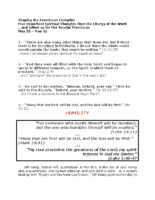Shaping the Franciscan Footprint
Five Important Spiritual Thoughts from the Liturgy of the Word
…and follow up for the Secular Franciscan
May 25 – May 31
1 – “There are also many other things that Jesus did, but if these were to be described individually, I do not think the whole world would contain the books that would be written.” (Jn 21:25)
…Have I developed a truly spiritual life based on Jesus?
2 – “And they were all filled with the Holy Spirit and began to speak in different tongues, as the Spirit enabled them to proclaim.” (Acts 2:4)
…Do I “proclaim” the presence of God in the way I act?
3 – He said to his mother, “Woman, behold, your son.” Then he said to the disciple, “Behold, your mother.” (Jn 19:26-27)
Do I have a devotion to the Blessed Virgin Mary?
4 – “Many that are first will be last, and the last will be first.” (Mk 10:31)
HUMILITY
“For everyone who exalts himself will be humbled,
but the one who humbles himself will be exalted.”
(Luke 14:11)
+++
“Many that are first will be last, and the last will be first.”
(Mark 10:31)
+++
“My soul proclaims the greatness of the Lord; my spirit rejoices in God my Savior.”
(Luke 1:46-47
Jeff Kemp, former NFL quarterback in the 80’s, is the son of Jack Kemp also a quarterback who turned politician and who died in 2009. In a speech dealing with “Sports and the American Dream,” Jeff Kemp gave some rules to live by on and off the playing field. His first rule was incredible for a sports professional. His first rule: humility.
He tells a story on himself. He was drafted by the Los Angeles Rams (in those days) in 1981, designated fifth-string quarterback. Actually he became a rather successful quarterback in the NFL, but he did not think he would survive training camp. The rookies were called in first and after about two days, a young boy came to him, and asked if he could carry his helmet to the locker room. Jeff felt rather honored, and liked being an idol for the ten-year-old. During that first week of practice and survival, the young man carried his helmet to the locker room every day. A couple of days before the practice actually started for everyone, the young boy said to him: “Jeff, can I ask you a question?” Jeff thought: this is my first fan; he’s going to ask me for my autograph. He felt good, pleased that he had impressed someone, even if it was a ten-year-old. “Absolutely,” he said. The ten-year-old said: “When do the good football players come to camp?
”Humility,” Jeff Kemp goes on to say, “was a good thing. It helped me appreciate what I had and avoid dwelling on what I did not have. It prevented complaining, which drains the spirit and unity of any group. It also led me to persevere and be ready whenever opportunity presented itself.”
One might not expect humility to be a quality that a former professional player would espouse, but it is one that you might expect from a religious leader. Jesus did exactly that in the Gospels.
Most of us realize that humility is defined to be nothing more or less than the truth, that is, looking at something from an objective point of view. It is very difficult, because we have a tendency to look at everything through our own eyes, with our own agenda, and our own agenda “colors” everything that we see or consider.
In the Gospels, the Pharisees felt that they had the truth, a truth that made them feel more important than anyone else, that they were worthy of respect and admiration. Jesus knew what they were thinking. He explained it to them saying that they must learn humility, that is, the truth, and the truth when it concerns others is that everyone is important.
Lack of humility was a fault that even the Apostles fell into.
The application for us is that we are called to be humble people, people who are dedicated to the truth, and when it concerns others, to realize that they are all equally important. We have a tendency to judge that we are better than others for whatever reason. Maybe we think we have more knowledge, more talent, more age, more money, more maturity, more whatever, and consequently, we place ourselves above others in some sense. We do it in a subtle way, of course. We will never say, “I am more important than you,” but we do it in our thoughts, or in our passing conversations. The objective truth is that everyone is important and we may be distorting that truth by our own jealousy or our own selfishness.
Jesus teaches us a very practical lesson: we must be humble people, that is, we must honor the truth at all times. The Christian will be humble in his/her approach to others not only because he/she is modest and respectful, but because he/she seeks the truth of who they are.
5 – “Blessed are you who believed that what was spoken to you by the Lord would be fulfilled.” (Lk 1:45)
…Mary’s faith was real. Is my faith what it should be?

